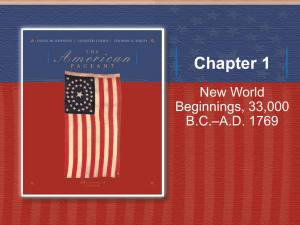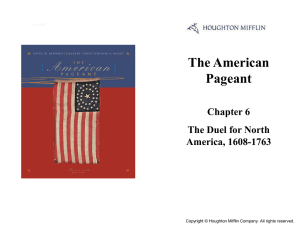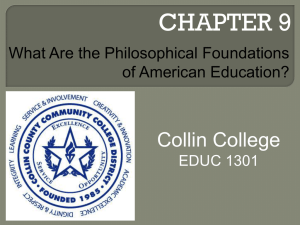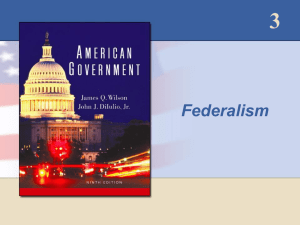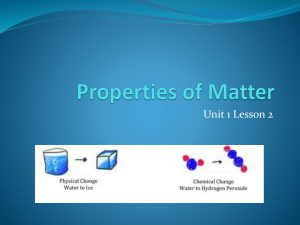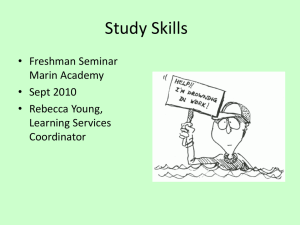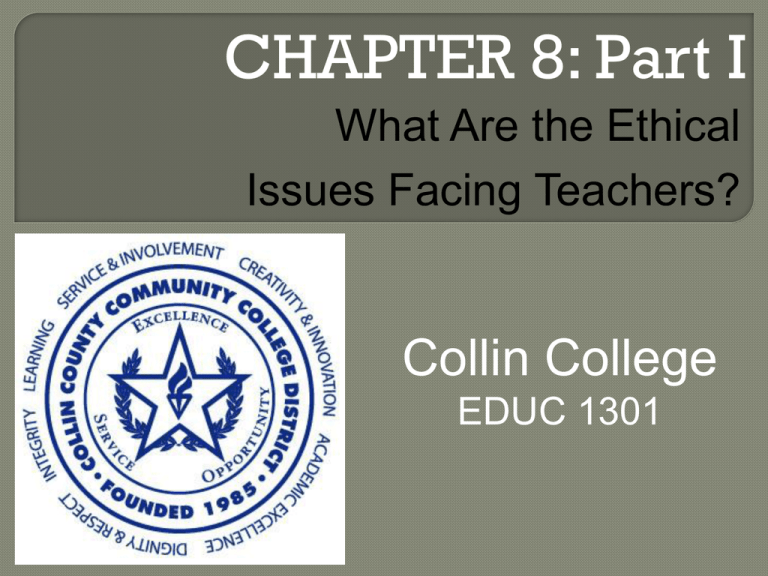
CHAPTER 8: Part I
What Are the Ethical
Issues Facing Teachers?
Collin College
EDUC 1301
Appreciation
for moral deliberation
Empathy
Knowledge
Reasoning
Courage
Interpersonal
skills
Copyright by Houghton Mifflin Company. All rights
reserved.
82
1.
2.
3.
Personal example - the way you do your
work and treat your students demonstrates
your ethical values.
Classroom climate - an environment of
safety and trust lets students cooperate and
learn.
Ethical dialogue - discussing core ethical
values helps students clarify their own ethics.
Copyright by Houghton Mifflin Company. All rights
reserved.
83
Kenneth Howe discusses how teachers must
have the capacity for moral deliberation. Your
group will consider an ethical scenario to help
you enhance your ability for ethical
deliberation. Your group will do the following
with the assigned scenario:
•
Define the problem
•
List the relevant moral or legal imperatives
•
Brainstorm a few solutions
•
Determine the pros and cons of each proposed solution.
Copyright by Houghton Mifflin Company. All rights
reserved.
84
Texas Administrative Code
•
Title 19; Part 7; Chapter 247
Found Online at: SBEC’s Web-Site
Resolving Ethical Dilemmas
Ends-based thinking
Rule-based thinking
Care-based thinking
Ethical Scenarios Activity
Copyright by Houghton Mifflin Company. All rights
reserved.
85
POVERTY
SIMULATION
• March 8 6:00-10:00 SCC Living Legends Center
POSITIVE
CLASSROOM PAPER
• March 22
PHILOSOPHY
PAPER
• March 29
Copyright by Houghton Mifflin Company. All rights
reserved.
86
CHAPTER 8: Part II
What Are the Legal
Issues Facing Teachers?
Just a sample of laws Texas Education Code
Texas Administrative Code
U.S Constitution (1st, 4th, 14th Amendments)
United States Code (Various Chapters)
Family Educational Rights & Privacy Act of
1974 (FERPA)
No Child Left Behind Act of 2001
Elementary & Secondary Education Act of 1965
Copyright by Houghton Mifflin Company. All rights
reserved.
88
Contract
Legally binding agreement
Grievance
Formal expression of complaint
about unsatisfactory working
condition
Continuing
Contract
Terms remain in force indefinitely,
until notice of change
Breach of
Contract
Violation of conditions of contract
Copyright by Houghton Mifflin Company. All rights reserved.
8-9
Contracts must:
Have a lawful subject matter.
Represent a meeting of the minds of both
parties.
Include an exchange of something of value.
Be entered into by parties who are
competent to do so.
Be written in proper form.
Be ratified by the school board.
Copyright by Houghton Mifflin Company. All rights
reserved.
810
Probationary Teachers
• Up to 3 years
• Non-renewal without cause
• Fire with cause
Term
Contracts
• 1 or 2 year term
• Non-renewal or fire with cause
Continuing
Contracts
• No longer offered in Texas
• Automatically renew
Copyright by Houghton Mifflin Company. All rights
reserved.
811
Try
to anticipate dangerous situations
Take precautions to avoid or reduce danger
Establish rules for dangerous situations
Warn students about possible dangers
Supervise students carefully
NEVER leave students unsupervised
Legal standard: “Reasonable and Prudent”
Copyright by Houghton Mifflin Company. All rights
reserved.
812
Repeated
injuries, such as bruises, welts,
and burns
Neglected appearance
Sudden changes in academic
performance
Disruptive behavior or passive, withdrawn
behavior
“Supercritical,” socially isolated parents
Copyright by Houghton Mifflin Company. All rights
reserved.
813
Student
• May not disrupt orderly atmosphere of school
• Limited legal rights as a child
• “En loco parentis”
Teachers
• May not disrupt orderly atmosphere of school
• May not affect ability to perform teacher duties
• Very limited on school property
Copyright by Houghton Mifflin Company. All rights
reserved.
814
Teachers may:
Make a single copy for class use of a:
• Chapter from a book
• Newspaper or magazine article
• Diagram, chart, picture, or cartoon from a book or
magazine
Make
a copy for each student of:
• Articles and short stories - fewer than 2500 words
• Poems - fewer than 250 words & printed on two
pages or less
Copyright by Houghton Mifflin Company. All rights
reserved.
815
Flag
Cannot require students to salute or stand for
Bible
• Can study without promoting worship
• If intended to promote worship, may not be read in
a public school, even without comment
Prayer
• Cannot be a regular part of the school day or
events
• Individuals may pray outside school hours
Worship • School sponsored unconstitutional, even if voluntary
services • Prayer groups can meet outside school hours
Copyright by Houghton Mifflin Company. All rights reserved.
8 - 16
Creationism
vs. Evolution
Bible Classes
Religious Clubs in Schools
Can a church rent space in the school?
Copyright by Houghton Mifflin Company. All rights
reserved.
817
To
protect self or other students or staff
Use reasonable force
Keep a “level head”
Copyright by Houghton Mifflin Company. All rights
reserved.
818
Legal
in Texas
Against policy in many districts
Many liability issues
Avoid if possible
Copyright by Houghton Mifflin Company. All rights
reserved.
819
In-school
suspension - brief duration,
usually for minor violations of rules
Out-of-school suspension - longer
duration, for more serious violations
Expulsion - permanent separation from
school, for major offenses
Copyright by Houghton Mifflin Company. All rights
reserved.
820
1.
2.
3.
Documentation - students must be
notified, orally or in writing, of the nature
of their offense and the intended
punishment
Explanation - the school must give a
clear explanation of the evidence
Opportunity to defend oneself students must have the chance to refute
charges before a fair and impartial
decision maker
Copyright by Houghton Mifflin Company. All rights
reserved.
821
Substantive
The issue itself
• Is the issue of
sufficient
importance to deny
a property interest
Procedural
Is the process
used in handling
the case fair?
Copyright by Houghton Mifflin Company. All rights
reserved.
822
Substantive
Due Process
• Punishment must fit the crime
• Misbehavior must warrant the loss of rights
Procedural
Due Process
• More process for more loss of rights
Right to be heard
Notice
Hearing
Confront Witnesses
Impartial Decision Maker
Copyright by Houghton Mifflin Company. All rights
reserved.
823
The opportunity to be heard at a reasonable
time and place
An effective opportunity to defend oneself
An opportunity to confront and cross-examine
witnesses
The right to retain an attorney; an impartial
decision maker
A decision resting solely on legal rules and
evidence
A statement of the reasons and evidence for a
decision
Copyright by Houghton Mifflin Company. All rights
reserved.
824
Reasonable Suspicion
Scope and conduct of
search are logically
related to
circumstances that led
to the search
Sufficient cause for
some in-school
searches, such as
locker searches
Probable Cause
Based on a substantial
reason for believing
the person posses
something illegal
Required outside of
school
Needed for invasive
searches in school
Copyright by Houghton Mifflin Company. All rights
reserved.
825
Family
Educational Right to Privacy Act
Educational right-to-know
Education records limited to
parent/student
Records kept of who sees or has access to
records
What can’t a teacher do anymore?
Copyright by Houghton Mifflin Company. All rights
reserved.
826
Your group will consider an legal scenario and
you must follow the existing laws, as discussed
in class. Your group will do the following with
the assigned scenario:
•
Identify the applicable law(s)
•
Describe the teacher’s and/or student’s rights and/or
responsibilities
•
Describe a legal course of action for their classroom
•
Identify ways the situation could be avoided in the future
•
Answer any other probe questions included in the case
Copyright by Houghton Mifflin Company. All rights
reserved.
827

